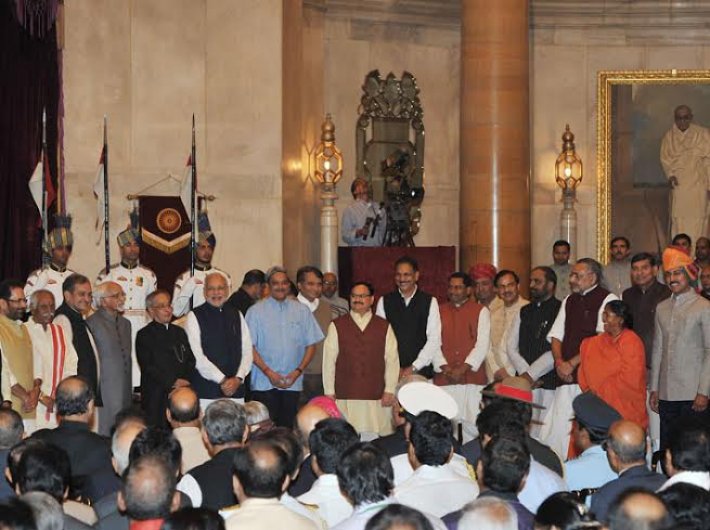Modi promised a clean break from politics-as-usual, but cabinet expansion signals a return to casteism and cronyism
A day is a long time in politics. November 9, the day when prime minister Narendra Modi expanded his cabinet, was such a day. Every moment of the induction of 21 new members in the council of minister was suffused with a sense of déjà vu. Hence, the event was devoid of novelty. The Shiv Sena’s attempt to introduce an element of suspense was also so predictable that the 40-minute function at the Rashtrapati Bhavan proved to be a drab affair.
Contrast this with the hopes Modi had raised just before he had taken over. He was quite categorical in his insistence that his maxim of “minimum government and maximum governance” would not be a mere slogan but would be turned into reality. This was the precise reason why he asked a team of his officials, including the new principal secretary, to restructure governance. They dutifully worked out verticals through which many ministries were either merged or obliterated to ensure effective governance. There were all indications that the new PM was determined to break the mould and embark on a new style of governance.
November 9 can be counted as a day that belied the great expectations. Here was the prime minister who removed his railway minister after merely five months – and not for trivial reasons. Those aware of the gossip in the Rail Bhavan would know that Sadanand Gowda’s inefficiency and indiscretion were unparalleled in the annals of the railways. No doubt, Suresh Prabhu is an excellent choice, and he is known to be highly efficient. Yet he is bequeathed with a dubious legacy that needs to be sorted out first.
Now look at the caste calculus that determined the contours of the expanded cabinet. In Bihar where the assembly elections are slated in less than a year, Giriraj Singh was chosen in the council ministers ignoring the controversy that surrounds him. The recovery of a huge sum of unaccounted money from his residence after the Lok Sabha elections is still a case in progress. His induction was clearly aimed at winning over Bhumihars while Rajiv Pratap Rudy was brought in to rope in Rajputs. Similarly, Mahesh Sharma from Noida, a doctor by profession and owner of Kailash Hospital, was selected to pacify Brahmins in Uttar Pradesh. Though Sharma claims to be a philanthropist, the phenomenal growth in his business is a testimony to his enormous clout in UP cutting across party lines.
The induction of turncoats like Birender Singh and Ram Kripal Yadav in the council of minister was clearly a reward for opportunism. In both cases, the castes and not credentials determined their political ascendancy. Singh, a jat from Haryana, found favour with the BJP for having delivered Haryana to the party’s kitty. In the same vein, Yadav is expected to wean away yadavs from Lalu Prasad in Bihar to turn the situation around for the BJP. “Principles” become a convenient fig leaf to cover up crass opportunism.
For those who have witnessed the solemn ceremony of swearing-in many a times, it will be difficult to miss the ringing sound of pious pledge, “I will do right to all manner of people in accordance with the constitution and the law without fear or favour, affection or ill-will.” But invariably this pledge has been violated in letter and spirit for years on end. November 9 was hardly an exception. Dr Harsh Vardhan was removed as health minister and replaced by Jay Prakash Nadda, a leader from Himachal Pradesh, who was accused of persecuting Sanjeev Chaturvedi, an IFS officer and whistle-blower posted as central vigilance officer (CVO) in AIIMS. The circumstances in which the change was effected will raise questions about the government’s conduct.
These issues are flagged not out of cynicism. Far from it. What is intended here is highlighting the people’s aspirations for change and expectations from the government. Modi seems to have initially responded to those impulses when he promised to change the culture of governance. His selection of colleagues like Manohar Parrikar is particularly praiseworthy. Similarly he was acutely conscious of choosing men with impeccable records in Haryana and Maharashtra, two crucial states with huge economic significance, as chief ministers. Yet he seemed to be afflicted by the usual bug of casteism and cronyism in the next stage of politics. Perhaps he may be guided by pragmatism that prompts him to stick to stated truism. As the adage goes, the more things change, the more they remain the same.



